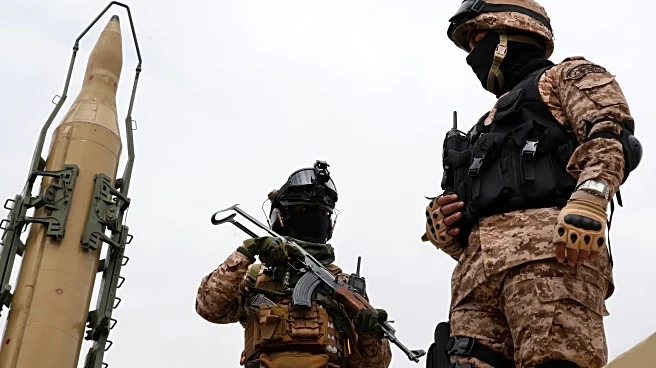DUBAI, United Arab Emirates (AP) — Iran's paramilitary Revolutionary Guard has grown into a powerful force with the country's theocracy, answering only to its supreme leader and overseeing its ballistic
missile arsenal and missions overseas.
The force was in the spotlight Tuesday when Australia accused Iran of organizing two antisemitic attacks in the country. The allegation recalls earlier attacks and attempted assaults linked back to the Guard’s Quds Force, its expeditionary arm. “Quds” is a word in both Arabic and Farsi for Jerusalem and reflects one of the force's key missions: confronting Israel.
Here's more to know about the Guard.
The Guard was born from Iran’s 1979 Islamic Revolution as a force meant to protect its Shiite cleric-overseen government and later enshrined in its constitution. It operated parallel to the country’s regular armed forces, growing in prominence and power during a long and ruinous war with Iraq in the 1980s. Though facing possible disbandment after the war, Supreme Leader Ayatollah Ali Khamenei granted it powers to expand into private enterprise, allowing it to thrive.
The Guard's Quds Force was key in creating what Iran describes as its “Axis of Resistance” against Israel and the United States. It backed Syria's former President Bashar Assad, Lebanon's Hezbollah, Yemen's Houthis and other groups in the region, growing in power in the wake of the U.S.-led invasion of Iraq in 2003.
U.S. officials say the Guard taught Iraqi militants how to manufacture and use especially deadly roadside bombs against U.S. troops there. The Quds Force, as well as Iranian intelligence agencies, are believed to have hired criminal gangs and others to target dissidents and Iran's perceived enemies abroad.
Since the Israel-Hamas war, Israel has arrested citizens it has accused of receiving orders from Iran to surveil targets or conduct vandalism. Iran has denied being involved in those plots. The Guard is also believe to be heavily involved in smuggling throughuot the Mideast.
The Guard also operates its own intelligence services and has been behind a series of arrests and convictions of dual nationals and those with Western ties on espionage charges in closed hearings. Western nations and others described Iran as using those prisoners as bargaining chips in negotiations, particularly over its nuclear program.
After making its announcement about Iran, Australia warned its citizens in Iran to immediately leave if they were able, noting they closed their embassy and that “foreigners in Iran, including Australians and dual Australian-Iranian nationals, are at a high risk of arbitrary detention or arrest.”
The Guard's carefully laid “Axis of Resistance” has faced its greatest challenge in the wake of the Oct. 7, 2023, Hamas attack on Israel. Hamas was one of the groups backed by Iran. Israel launched a war against the group in the Gaza Strip which rages on today. Meanwhile, Israel began targeting other Iranian-backed groups, decimating Hezbollah and repeatedly targeting the Houthis in Yemen.
In Syria, Assad's government fell in December, taking away a key ally for Tehran and the Guard. Israel and Iran exchanged missile fire, something overseen by the Guard.
But in June, Israel launched a massive airstrike campaign targeting Iran. In its first day, those strikes killed top generals in the Guard, throwing the force into disarray. Israeli attacks also destroyed ballistic missile sites and launchers, as well as Guard-manned air defense systems.












